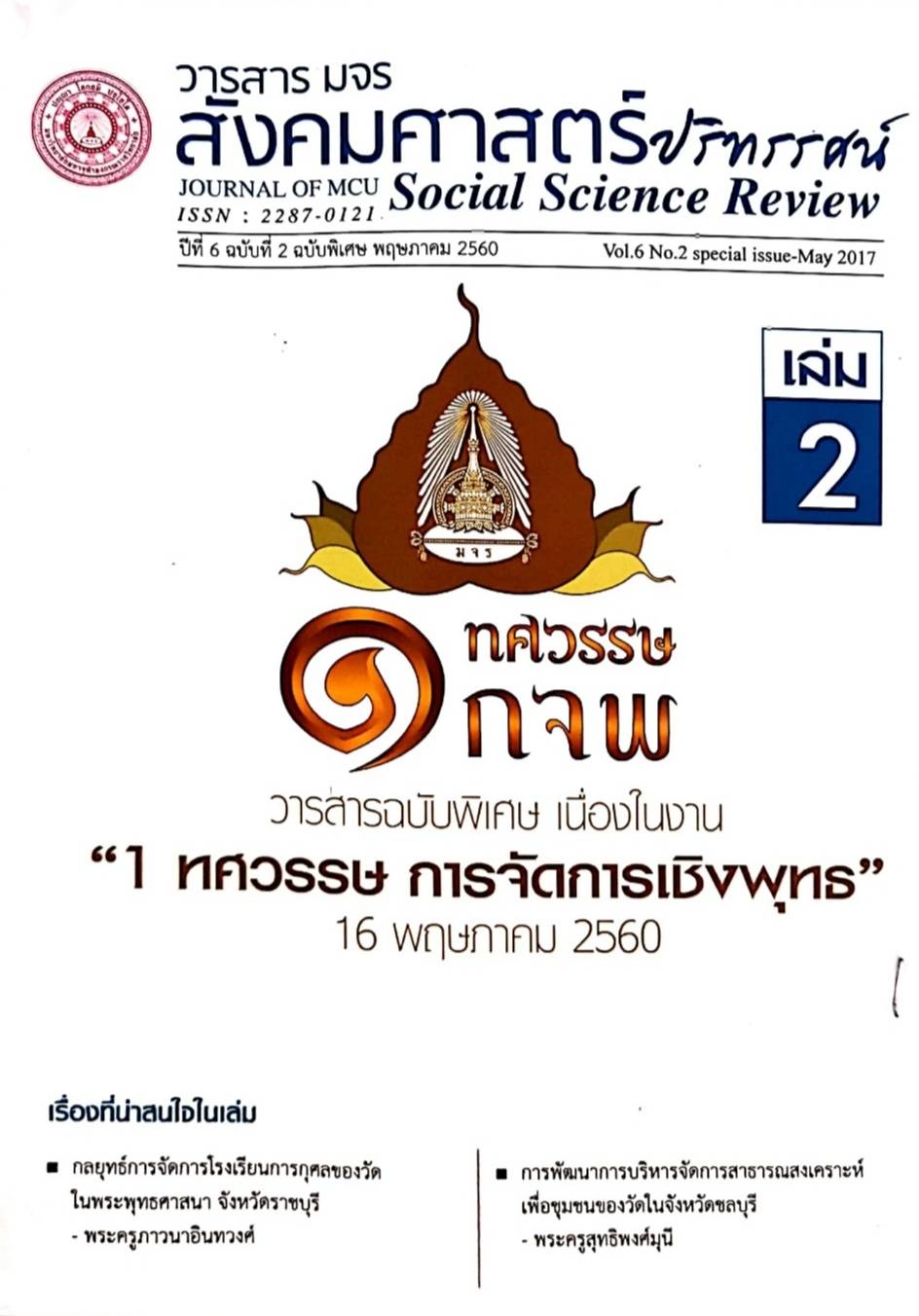เครือข่าย: การเฝ้าระวังทางวัฒนธรรมของการดำเนินการทางธุรกิจขาย ตรงในภาคอีสาน
คำสำคัญ:
วัฒนธรรมของการดาเนินการทางธุรกิจ ธุรกิจขายตรง เครือข่าย ภาคอีสานบทคัดย่อ
บทความเรื่องเครือข่าย : การเฝ้าระวังทางวัฒนธรรมของการดาเนินการทางธุรกิจขายตรงในภาคอีสาน ใช้ระเบียบวิธีวิจัยเชิงคุณภาพ (Qualitative Research) เลือกพื้นที่ ทำการเก็บข้อมูลภาคสนามที่เกี่ยวกับประเด็นวิจัย ความมุ่งหมายของการวิจัยคือ 1) เพื่อศึกษาความเป็นมาของวัฒนธรรมธุรกิจเครือข่ายและขายตรงในภาคอีสาน 2) เพื่อศึกษาสภาพปัญหาของวัฒนธรรมธุรกิจเครือข่ายและขายตรงในภาคอีสา น3) เพื่อศึกษาแนวทางการเฝ้าระวังวัฒนธรรมธุรกิจเครือข่ายและขายตรงในภาคอีสาน ผลการวิจัยพบว่า ธุรกิจขายตรงในประเทศไทยเริ่มเข้ามามีบทบาท เมื่อประมาณ 40 ปีที่แล้วนี่เอง เนืองจากธุรกิจขายตรงเป็นธุรกิจที่เปิดโอกาสให้กับคนทุกชนชั้น ทุกเพศทุกวัย ทุกสังคม การขายตรงในประเทศไทยจึงเติบโตอย่างรวดเร็ว แต่มีสภาพปัญหาของวัฒนธรรมทางธุรกิจ และธุรกิจเครือข่ายขายตรงในภาคอีสาน ใน 7 ด้าน ผู้วิจัยสังเกตว่า สินค้าในระบบการตลาดหลายชั้นที่แท้จริง ต้องมีลักษณะดังนี้ 1) สินค้านั้นมีประโยชน์จริง ใช้แล้วหมดไปและต้องซื้อหามาใช้ใหม่ 2) สินค้านั้นสามารถนาไปขายปลีกได้จริง และผู้ขายจะมีรายได้เป็นผลกำไรจากการขายปลีก 3) สินค้านั้นได้ผ่านขั้นตอนการนาเข้าและชาระภาษีอากรอย่างถูกต้องตามกฎหมาย 4) สินค้าประเภทเครื่องสำอาง ผลิตภัณฑ์เสริมอาหาร หรือสินค้าบำรุงสุขภาพต้องผ่านการขึ้นทะเบียนและอนุญาตให้จาหน่ายได้จากสานักงานคณะกรรมการอาหารและยา (อย.)เรียบร้อยแล้ว 5) สินค้านั้นต้องมีฉลากบรรยายสรรพคุณ และวิธีใช้อย่างถูกต้องตามกฎเกณฑ์ของสำนักงานคณะกรรมการคุ้มครองผู้บริโภค (สคบ.) 6) สินค้าบางประเภทต้องมีใบอนุญาตโดยเฉพาะให้จัดจาหน่ายได้ เช่น สุรา ต้องมีใบอนุญาตจากกรมสรรพสามิต เป็นต้น 7) สินค้านั้นต้องมีการรับคืนหรือมีการรับประกันจากบริษัทผู้จัดจำหน่าย โดยมีเอกสารจากบริษัทเผยแพร่อย่างชัดเจน
เอกสารอ้างอิง
Brodie, S., Stanworth, J. and Wotruba, T.R. 2002. Direct sales franchises in the UK: Aself-employment grey area. International Small Business Journal. 20(1): 53-76.
Brüderl, J. and Preisendörfer, P. 1998. Network support and the success of newly founded business. Small business economics, 10(3):213-225.
Brun, V., Schumacher, T. and Bjørnland, T. 1994. Traditional herbal medicine in Northern Thailand. Bangkok: White Lotus.
Hewison, K. 2000. Resisting globalization: a study of localism in Thailand. The Pacific Review, 13(2):279-296.
Kluckhohn, C. 1936. Some reflections on the method and theory of the Kulturkreislehre. American Anthropologist, 38(2): 157-196.
Pakdeesukanan, A. 2003. Factors affecting the principles and decision-making of the sales system of Mistine. Bangkok: Srinakharinwirot University.
Peterson, R.A. and Wotruba, T.R. 1996. What is direct selling? - Definition, perspectives, and research agenda. Journal of Personal Selling & Sales Management, 16(4): 1-16.
Piboolsravut, P. 2004. Sufficiency economy. ASEAN Economic Bulletin, 21(1): 127- 134.
Singsangob, A. 2004. Consumer rights vs. business networks. Bangkok: Office of the Basic Education Commission.
Srisang, S. 2004. Implementation, comparison and adaptation of fines for law breakers. Bangkok: Office of the Council for Food and Medicine.
Sylvain, R. 1996. Leo Frobenius: From "Kulturkreis” to “Kulturmorphologie". Anthropos: 483-494.
ดาวน์โหลด
เผยแพร่แล้ว
รูปแบบการอ้างอิง
ฉบับ
ประเภทบทความ
สัญญาอนุญาต
ลิขสิทธิ์ (c) 2020 วารสาร มจร สังคมศาสตร์ปริทรรศน์

อนุญาตภายใต้เงื่อนไข Creative Commons Attribution-NonCommercial-NoDerivatives 4.0 International License.
เพื่อให้เป็นไปตามกฎหมายลิขสิทธิ์ ผู้นิพนธ์ทุกท่านต้องลงลายมือชื่อในแบบฟอร์มใบมอบลิขสิทธิ์บทความให้แก่วารสารฯ พร้อมกับบทความต้นฉบับที่ได้แก้ไขครั้งสุดท้าย นอกจากนี้ ผู้นิพนธ์ทุกท่านต้องยืนยันว่าบทความต้นฉบับที่ส่งมาตีพิมพ์นั้น ได้ส่งมาตีพิมพ์เฉพาะในวารสาร มจร สังคมศาสตร์ปริทรรศน์ เพียงแห่งเดียวเท่านั้น หากมีการใช้ภาพหรือตารางหรือเนื้อหาอื่นๆ ของผู้นิพนธ์อื่นที่ปรากฏในสิ่งตีพิมพ์อื่นมาแล้ว ผู้นิพนธ์ต้องขออนุญาตเจ้าของลิขสิทธิ์ก่อน พร้อมทั้งแสดงหนังสือที่ได้รับการยินยอมต่อบรรณาธิการ ก่อนที่บทความจะได้รับการตีพิมพ์ หากไม่เป็นไปตามข้อกำหนดเบื้องต้น ทางวารสารจะถอดบทความของท่านออกโดยไม่มีข้อยกเว้นใดๆ ทั้งสิ้น





